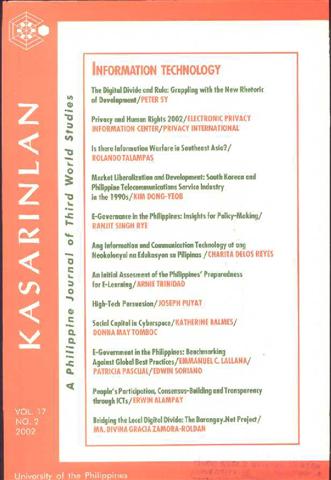An Initial Assessment of the Philippines Preparedness for E-Learning
Abstract
Any attempt to institutionalize e-learning will prove futile without first attaining its vital requisites. An initial assessment of the Philippines’ e-learning stature both depicts a glooming and changing scenario. Three crucial domains need further reinvigoration: technology and infrastructure, educational standards and literacy, and government-private sector teamwork. Access to phone lines, computers and the internet cannot substitute to the greater need to develop the academic well-being of Filipino students. E-learning requires higher-order skills and analytical thinking. Raising the quality of training of teachers and students is a must to maximize the promises of Internet technology. The apparent lackluster performance of the Department of Education (DepEd) in providing the basic needs of primary and secondary high schools and the low standard of education seems to be steps backward to this end. Emphasis should be given on raising students’ English language proficiency and ‘digital fluency’. The public sector cannot carry the burden of forming an e-learning society alone. The government’s collaboration with the private sector in programs such as PREGINET, Fit-Ed programs and the ASTI- and PLDT-sponsored project testifies to this truth.
How to Cite
TRINIDAD, Arnie.
An Initial Assessment of the Philippines Preparedness for E-Learning.
Kasarinlan: Philippine Journal of Third World Studies, [S.l.], v. 17, n. 2, oct. 2007.
ISSN 2012-080X.
Available at: <https://journals.upd.edu.ph/index.php/kasarinlan/article/view/1659>. Date accessed: 23 sep. 2025.
Section
Features
By submitting a manuscript, the authors agree that the exclusive rights to reproduce and distribute the article have been given to the Third World Studies Center.



